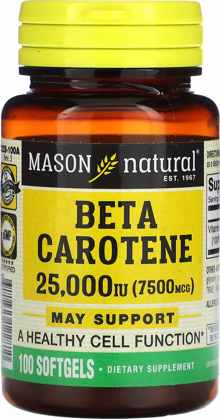Mason Naturals Beta Carotene
Price ComparisonsHow does this work and how do stores get listed? See our disclosure below to learn more.
100 Softgels
-
Search for Mason Naturals Beta Carotene on Amazon.com
-
Search for Mason Naturals Beta Carotene on eBay

Statement of Disclosure
PricePlow relies on pricing from stores with which we have a business relationship. We work hard to keep pricing current, but it is possible that you might find a better offer on your own. Additional shipping and taxes may apply. Data may be mismatched or out of date. Prices may be converted from non-USD currencies (denoted by †) and may not reflect current exchange rates. Prices may reflect coupon-based pricing (denoted by the icon).
If you run an online retail store with a diverse product list, contact us to learn how to get listed.
We'll notify you as soon as the price drops.
Price History
*Note: Amazon Data is not used in PricePlow's price history graphs.
- 100 Softgels
Historic Prices
| Size | Current | Lowest | Average |
|---|---|---|---|
| 100 Softgels |


